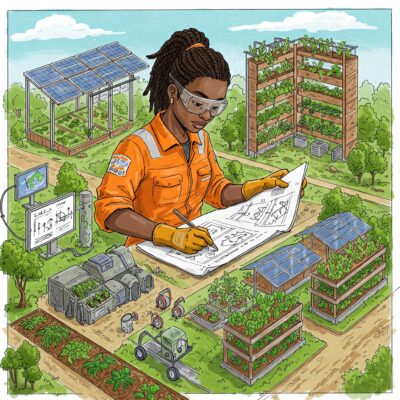Environmental planners ensure that development projects comply with environmental regulations and promote sustainability. They assess the environmental impact of proposed projects and develop strategies to minimize adverse effects.
What is a typical day as a Environmental Planner?
– Conducting environmental impact assessments for proposed developments
– Reviewing project proposals to ensure compliance with environmental laws
– Collaborating with developers, architects, and engineers to incorporate sustainable practices
– Writing reports and presenting findings to stakeholders, including government agencies.
What else might they be expected to do?
– Develop and implement policies to promote sustainable development
– Monitor ongoing projects to ensure adherence to environmental guidelines
– Engage with community members to address environmental concerns
What type of training is needed for this career path?
– A Bachelor’s degree in Environmental Science, Urban Planning, Geography, or a related field is required.
– A Master’s degree in Environmental Planning, Sustainability, or Urban and Regional Planning is advantageous for advanced roles.
– Certification in environmental impact assessment or sustainability practices is beneficial.
What kind of personality is needed to excel in this career path?
– Detail-oriented, analytical, and solution-driven individuals thrive in this role.
– Big 5 traits: Conscientiousness and Openness.
– Myers-Briggs types: INTJ or ISTP often align with this career.
What kind of interests do people in this career path have?
– Passion for protecting the environment and promoting sustainable growth (Investigative and Realistic traits).
– Interest in urban development, conservation, and environmental law.
– Interests & Aptitude: Investigative (I), Realistic (R), and Enterprising (E)
Are there any innate skills or aptitudes required?
– Strong research and analytical skills for assessing environmental impacts
– Communication skills to present findings and negotiate with stakeholders
– Technical proficiency in GIS and environmental modeling tools
What challenges can I expect to face if I pursue this career path?
– Balancing environmental protection with development priorities
– Navigating complex regulatory frameworks and compliance issues
– Addressing resistance from stakeholders with conflicting interests
What are the job prospects for this path in Kenya and Africa? What about International prospects for a Kenyan citizen?
– Kenya and Africa: High demand for environmental planners as urbanization and infrastructure development increase. Opportunities exist in government agencies, NGOs, and consulting firms.
– International: Globally, environmental planners are in demand in countries prioritizing sustainable development. Kenyan professionals with expertise in environmental compliance can access roles in organizations like UNEP, global consultancies, or urban planning firms.
What should I focus on if I choose to pursue this career?
– Gain technical skills in environmental impact assessment and GIS tools.
– Develop expertise in specific areas, such as renewable energy or waste management.
– Build strong collaboration and negotiation skills to work with diverse stakeholders.
Which other careers or job roles can I progress to?
– Urban Planner
– Environmental Scientist
– Policy Advisor in Sustainability
– Project Manager for Development Firms

